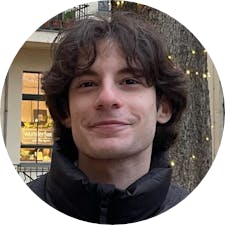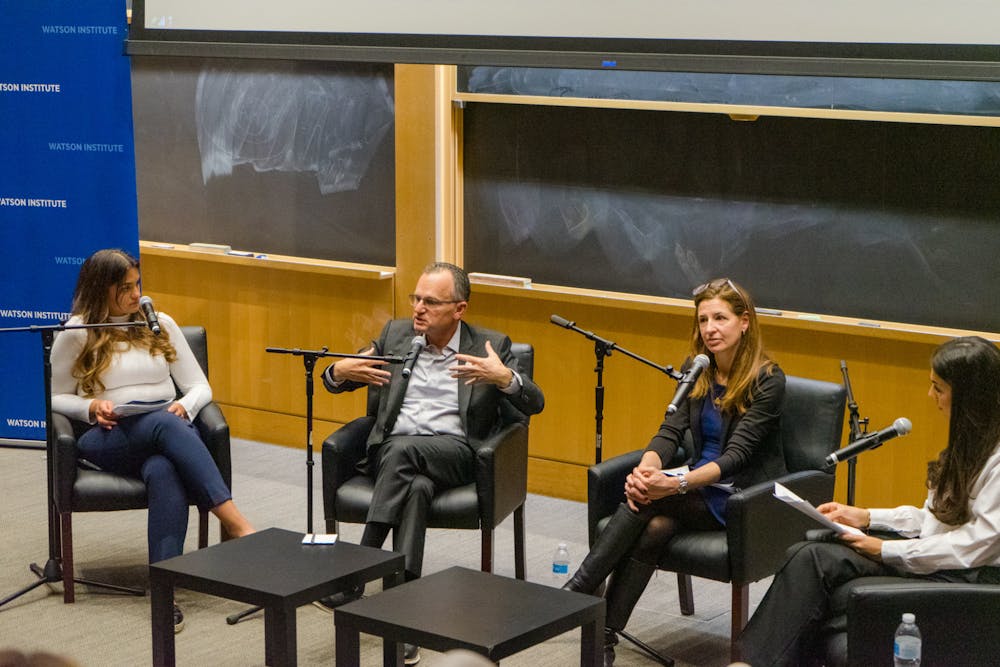The Brown/RISD Arab Society held a panel discussion Tuesday evening titled “Lebanon: A State in Collapse” in MacMillan Hall. Organized in collaboration with the Watson Institute for International and Public Affairs, the event was moderated by Serena Fadel ’25, Tania Sawaya ’22 and Nader Maarouf ’23 and included three panelists: Paul Salem, president of the Middle East Institute, Melani Cammett, director of the Weatherhead Center for International Affairs at Harvard University, and Ferid Belhaj, vice president of the World Bank for the Middle East and North Africa.
The aim of the panel was to provide attendees with “political, economic and humanitarian perspectives (on) the ongoing crisis in Lebanon” — particularly in the context of the country’s current hyperinflation, the August 4 Port of Beirut explosion and the Lebanese Revolution, according to the event description.
Elias Muhanna, associate professor of comparative literature and history, opened the panel with introductory remarks. Lebanon is a “land of contradictions. It’s a place that embodies many different contradictions on a topographical level, geographical level, cultural level (and) political level,” he said. “In a region known for its totalitarian regimes, Lebanon is known for its freewheeling, dynamic (and) ungovernable system.”
Over the past 50 years of Lebanese history, a pattern has emerged where “about every 15 years, … all of the arrangements that have been put into place to govern this very strange and beautiful country eventually kind of fall apart,” Muhanna added. He recalled the Lebanese Civil War, which lasted from 1975 to 1990, the Syrian occupation of Lebanon between 1990 and 2005 and a chapter of rebuilding between 2005 and 2020 which culminated in the country’s economic collapse.
In 2020, in light of the explosion at the Port of Beirut — one of the world’s biggest non-nuclear explosions which left more than 200 dead — and banking, currency, health and security crises, the Lebanese economy collapsed, Muhanna said.
“What has to happen for this 15-year period to come to an end and for the country to pick itself up in the way that it did during the previous periods?” Muhanna asked the panelists. “Has it actually reached a point where it can’t pick itself up anymore, where there has to be some kind of … replacement of the deck with something completely different?”
“Lebanon is defying gravity and that gravity, at some point, catches up to you,” Belhaj said. The country has had to support a massive Syrian refugee population and endured an energy and food crisis in 2021, he added. As of October 2021, nearly 78% of the Lebanese population was living under the poverty line.
Ferid referred to the current crisis in Lebanon as “The Great Denial.”
“This is a country where there is a deliberate depression orchestrated by its elites, … by people who really look more at their own interest (and) the interest of their clients more than the interest of the people and Lebanon itself,” he added.
The Lebanese government has “a power-sharing system among communities who have leaders that claim to work for the community,” Salem said, “but they are actually working for themselves.”
Following the Lebanese Civil War, political power came to be shared “so extensively that there was no longer anybody in charge,” he said. “This is a state that brought in warlords … and let them run the government. Now, these warlords brought their habits of warlordism, intense corruption (and) mafia-style politics, and that became the politics” of Lebanon, he added.
“Power-sharing systems have been said to win the war but lose the peace,” Cammett said. “They’re good at getting people to stop killing each other … because every party … gets a seat at the table in the new government. But then what happens is that they have to (actually) govern.”
In 2021, Lebanon was downgraded from an upper middle-income economic status to a lower middle-income economic status.
“On the economic side, I’m not very optimistic about the short term. We do have the (International Monetary Fund) agreement, but the things that are required to be done are not that easy,” Salem said. “I think it’s going to be an extremely rough ride for a number of years.”
Earlier this month, IMF reached a staff-level agreement on economic policies with Lebanon for a four-year extended reform program that aims “to rebuild the country’s economy, restore financial stability … and increase social and reconstruction spending,” according to the IMF website.
Lebanon is also facing a number of political obstacles between now and the end of the year, with the Lebanese general elections happening in May 2022, according to Salem.
“I also think it’s very important in addition to domestic (reforms) to have sustained international support,” he added.
Belhaj emphasized the importance of continued help from the international community, though he added that “it is getting more and more difficult.”
“Lebanon is in a serious dilemma right now because it absolutely needs aid,” Cammett said. “But if aid funnels through the existing political structures, then you’re simply … going to have the same kind of crisis at some (later) point.”
The Lebanese people have mobilized in an attempt to enact some structural changes, but “they haven’t managed to unify in a major way,” Salem said. “There are dozens, if not hundreds, of groups that are mobilizing,” but not under a single position. Salem is hoping that this year’s elections will introduce new faces to the Lebanese parliament.
“We have to do much better at working together,” he added.
“Grassroots mobilization and political organization have been shown in many places around the world to lead to important political changes,” Cammett said. “Organizing and reaching out and speaking to different communities and building an alternative is absolutely critical for political change.”
For John Owen Habib ’24, who identifies as part of the Lebanese diaspora, “the thought of having an event purely about Lebanon to bring international attention to the crisis was really appealing.”
“International attention and support has been one of the most important things for helping Lebanon out of the crisis and I think it’s super important that everyone can familiarize themselves with the different players and forces underlying the crisis,” he added. The panelists “are some of the most educated, qualified people in the world and I definitely learned a ton.”
“Young Lebanese people … are the key to changing the reality in Lebanon,” Belhaj said. “You are the hope and future of Lebanon.”

Alex Nadirashvili was the managing editor of multimedia and social media for The Brown Daily Herald's 133rd Editorial Board. As a former University News editor, he covered faculty, higher education and student life, though his proudest legacy is The Brown Daily Herald TikTok account.





